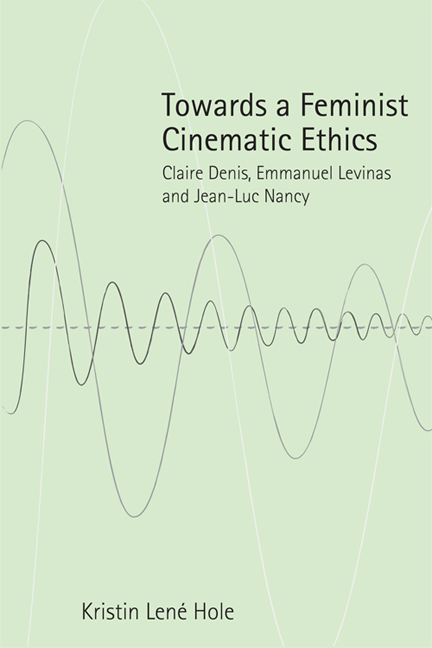Book contents
- Frontmatter
- Contents
- List of Figures
- Acknowledgements
- 1 Encounters, Intrusions: Denis, Levinas, Nancy
- 2 Film Interrupted: Denis, Nancy and an Ethics of Sense
- 3 Otherwise than Hollywood: Denis, Levinas and an Aesthetic of Alterity
- 4 Troubling the Body: Trouble Every Day, Dance and the Non-Mythic Body
- Coda
- Bibliography
- Index
1 - Encounters, Intrusions: Denis, Levinas, Nancy
- Frontmatter
- Contents
- List of Figures
- Acknowledgements
- 1 Encounters, Intrusions: Denis, Levinas, Nancy
- 2 Film Interrupted: Denis, Nancy and an Ethics of Sense
- 3 Otherwise than Hollywood: Denis, Levinas and an Aesthetic of Alterity
- 4 Troubling the Body: Trouble Every Day, Dance and the Non-Mythic Body
- Coda
- Bibliography
- Index
Summary
… for me, cinema is not made to give a psychological explanation, for me cinema is montage, is editing. To make blocks of impressions or emotion meet with another block of impression or emotion and put in between pieces of explanation, to me it's boring … [A]s a spectator, when I see a movie one block leads me to another block of inner emotion, I think that's cinema. That's an encounter … I think that making films for me is to get rid of explanation … you get explanation by getting rid of explanation. I am sure of that.
Claire DenisThe issue of intrusion has resonances for so much in life – phobia, rejection, desire. Intrusion is always brutal. There's no such thing as a gentle intrusion.
Claire DenisINTRUSIONS: ENCOUNTERING ETHICS IN THE FILMS OF CLAIRE DENIS
This book is about encounters: between philosophy and cinema, spectator and film, characters on screen, sound and image, body and text. The encounter is always also an intrusion, undermining the supposed discreteness of any body and offering us an ethical way to position ourselves towards one another. In what follows, intrusions generate a feminist cinematic ethics through the encounters staged amongst the work of Claire Denis and of two philosophers, Jean-Luc Nancy and Emmanuel Levinas, although other voices interrupt throughout. Denis is one of the most challenging and distinctive filmmakers working in France today. Despite the significant amount of scholarly attention that her filmmaking has received, the contribution that she makes to a cinematic ethics has not received any sustained analysis. Yet, my argument in what follows is that the ethical facet of her work is one of her main contributions to a cinema of ideas. I title the two permutations of a feminist cinematic ethics an ‘ethics of sense’ and an ‘aesthetic of alterity’, the former the result of an encounter between Denis and Nancean ethics and the latter between Denis and Levinas (these are dealt with in Chapters 2 and 3, respectively). Both an ethics of sense and an aesthetic of alterity are intimately connected to spectatorship as a bodily encounter that challenges dominant Western conceptions of subjectivity.
- Type
- Chapter
- Information
- Towards a Feminist Cinematic EthicsClaire Denis, Emmanuel Levinas and Jean-Luc Nancy, pp. 1 - 36Publisher: Edinburgh University PressPrint publication year: 2015



